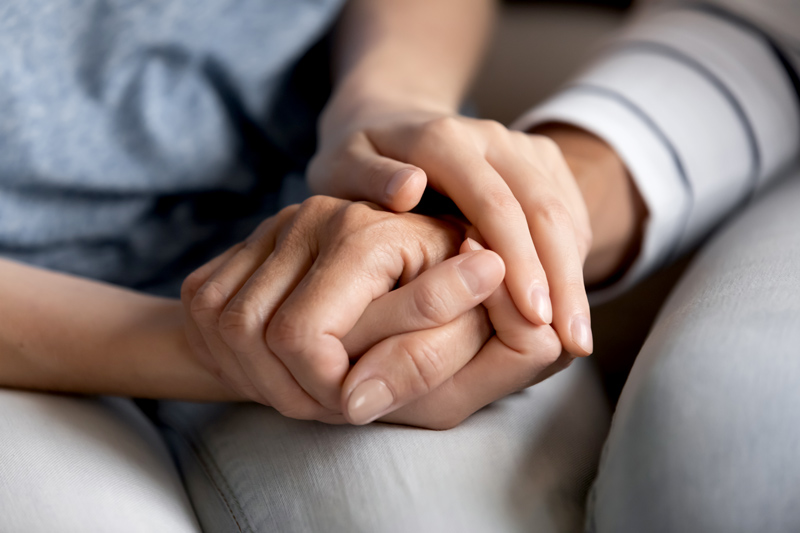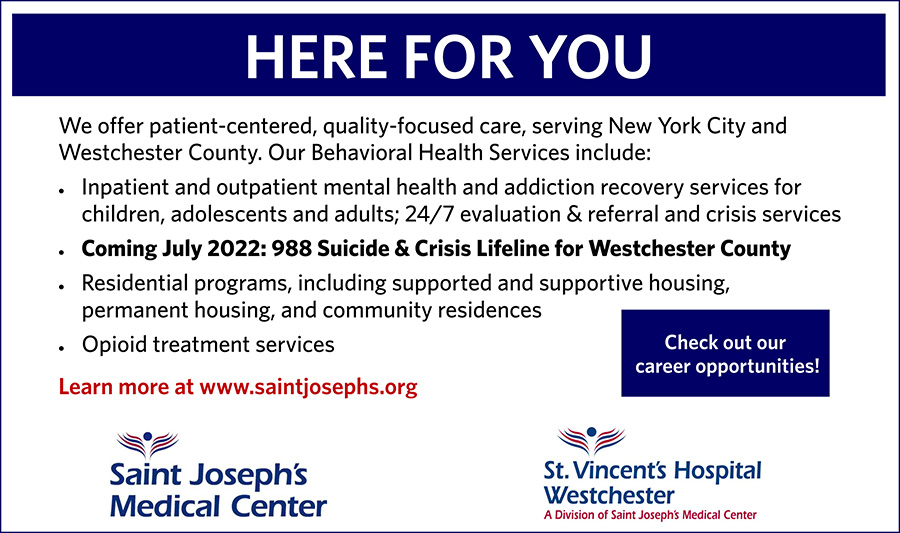At a recent fund-raising event I attended for St. Vincent’s, CNN correspondent Randi Kaye was honored for her efforts to promote suicide prevention. In her acceptance remarks, she spoke about her family’s shock, disbelief and unanswered questions when her father died by suicide.

She said: “I made a promise when he died that I would not bow to the stigma of suicide. I would talk about him, share his story. I want people to know that it’s okay to talk about this and we should be talking about this, so other families don’t have to go through what we went through.”
Earlier that day, Kaye visited St. Vincent’s and talked to the counselors who are handling Westchester County calls to the 988 Suicide and Crisis Lifeline. She spoke of her wish that her father had reached out to someone to ask for help.
The 988 Suicide & Crisis Lifeline (formerly known as the National Suicide Prevention Lifeline) offers 24/7 call, text and chat access to trained crisis counselors who can help people experiencing suicidal, substance use, and/or mental health crisis, or any other kind of emotional distress. People can also dial 988 if they are worried about a loved one who may need crisis support.
When families reach out about a loved one, they fear is considering suicide, trained counselors assess the safety of the loved one; educate the caller on how to support and increase safety for their loved one; take necessary, least-invasive action to increase safety for the person of concern; and provide support to the third party themselves, and assess for suicidal thoughts.
When a family member or friend reaches out, they may need support for themselves as well. Suicide impacts all of us: parents, children, siblings, friends, and partners. Our counselors provide support, empathy, and actively listen. We can provide resources for the family on how to support their loved one and how to get them help. There are times when someone is refusing help, when this occurs, we connect them with a local mobile crisis team who will go to the home and try to engage with them.
We have had families reach out on behalf of their adult child, after assessing for safety we connected them with their local crisis team who did a full mental health assessment and then referred them to a therapist.
If the individual in need will not reach out, we can call them together. When a loved one refuses help this can be very challenging for the family. Families often feel helpless, lost, guilty, and often frustrated as one person’s stressors or mental illness becomes a primary focus. When a loved one begins to detach or have reduced feelings of empathy they may be experiencing what is called compassion fatigue. When this occurs, our trained counselors can take the time to help families reflect and work on self-care.
Some Common Myths About Suicide
Myth 1: Talking about suicide increases the chance a person will act on it.
Fact: Talking about suicide may reduce, rather than increase, suicidal ideation. It improves mental health-related outcomes and the likelihood that the person would seek treatment. Opening this conversation helps people find an alternative view of their existing circumstances. If someone is in crisis or depressed, asking if he or she is thinking about suicide can help, so don’t hesitate to start the conversation.
Myth 2: People who talk about suicide are just seeking attention.
Fact: People who die from suicide have often told someone about not wanting to live anymore or they do not see the future. It’s always important to take seriously anybody who talks about feeling suicidal. It’s important to be kind and sensitive, and ask direct questions such as: “Are you thinking about hurting yourself?” “Are you thinking about suicide?” or “Do you have access to weapons or things that can be used as weapons to harm yourself?”
Myth 3: Suicide can’t be prevented.
Fact: Suicide is preventable but unpredictable. Most people who contemplate suicide often experience intense emotional pain, hopelessness and have a negative view of life or their futures. Suicide is a product of genes, mental health illnesses and environmental risk factors. Interventions targeted to treat psychiatric, and substance use illnesses could save lives.
Myth 4: People who take their own lives are selfish, cowards or weak.
Fact: People do not die of suicide by choice. Often, people who die of suicide experience significant emotional pain and find it difficult to consider different views or see a way out of their situation. Even though the reasons behind suicide are quite complex, frequently suicide is associated with psychiatric illnesses, such as depression, anxiety, bipolar disorder, schizophrenia and substance use.
Myth 5: Teenagers and college students are the most at risk for suicide.
Fact: The suicide rate for this age group is below the national average, and suicide risk increases with age. The age group with the highest suicide rate in the U.S is men and women between 45 and 64. Though particular groups may be at higher risk; suicide is a problem among all ages and groups.
Common Warning Signs
Common warning signs include:
- Talking about suicide — making statements such as “I’m going to kill myself,” “I wish I were dead” or “I wish I hadn’t been born.
- Getting the means to take your own life, such as buying a gun or stockpiling pills.
- Withdrawing from social contact and wanting to be left alone.
- Having mood swings, such as being emotionally high one day and deeply discouraged the next.
- Being preoccupied with death, dying or violence.
- Feeling trapped or hopeless about a situation.
- Increasing use of alcohol or drugs.
- Changing normal routine, including eating or sleeping patterns.
- Doing risky or self-destructive things, such as using drugs or driving recklessly.
- Giving away belongings or getting affairs in order when there is no other logical explanation for doing this.
- Saying goodbye to people as if they won’t be seen again.
- Developing personality changes or being severely anxious or agitated, particularly when experiencing some of the warning signs listed above.
If a friend or loved one talks or behaves in a way that makes you believe he or she might attempt suicide, don’t try to handle the situation alone. Get help from a trained professional as quickly as possible because the person may need to be hospitalized until the suicidal crisis has passed. Encourage the person to call 988 or, in the U.S., call the National Suicide Prevention Lifeline at 800-273-TALK (800-273-8255) to reach a trained counselor. Use that same number and press “1” to reach the Veterans Crisis Line. Service languages other than English are available.
You’re not responsible for preventing someone from taking their own life, but your intervention may help them see that other options are available to stay safe and get treatment.
When in doubt, always call 988 to consult. You do not have to do this alone.
Angela Jacobs, LCSW, is a Coordinator of 988 Services at St. Vincent’s Hospital Westchester, a Division of Saint Joseph’s Medical Center.








